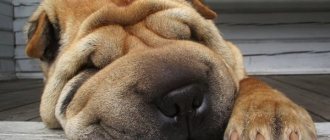Dogs, like people, need good sleep and rest. Adult animals sleep from 12 to 14 hours. Puppies require up to 20 hours a day. The more a pet rests, the better it exhibits physical activity, it is more balanced and calm. We’ll talk further about what sleep time depends on and how it affects the animal.
When and how do dogs sleep?
How many hours do dogs sleep?
Dogs can sleep most of the day.
They do not need to be on guard all the time in case any danger suddenly appears and they do not need to waste time searching for food. Also, most pets sleep soundly at night. This applies to pets that live in the apartment. Watchdogs sleep more lightly at night. You can often hear how one dog on the street begins to bark at night and everyone who could hear it starts barking after it. Additional Information! Dogs sleep in completely different positions - on their stomachs, on their backs, curled up.
Sometimes it’s not even clear how the dog went to sleep in such a strange position and how comfortable it is for him. When it's hot, animals sleep on the floor or crawl into secluded places, such as under the bed. When it’s cold, they move to a couch or to the master’s bed, if they are allowed to do so.
Most dogs have a similar daily routine. Dogs doze off after a morning walk and meal, then they can wake up, play with a toy and lie down again. Then come from the street and go to bed.
Sleep well
When it comes to dog sleep, there is no easy answer to whether your dog sleeps too much or too little. The best way to know for sure is to analyze a typical day for your dog and share the details with your veterinarian at routine checkups. He will determine whether your dog's sleep schedule is normal and, if it is not, recommend changes to the schedule or an evaluation. Once you understand your pet's sleep patterns are normal, you too can rest easy knowing that your dog is healthy and doing well.
How much do dogs sleep per day?
Reasons affecting how long a dog sleeps:
- Stress. Severe stress and psycho-emotional stress can be associated with moving, the appearance of a new pet or person in the house, or a long absence of the owner.
- Disease. Some diseases affect the duration of sleep more or less. Insomnia or, conversely, drowsiness may develop.
- Weather. Many pets begin to lie down more and more often when the cold season arrives. For example, in autumn and winter, when daylight hours are short and it is dark outside most of the day. Also, in rainy weather, dogs like to lie down to rest. Another period when the weather affects the duration of falling asleep is the summer heat. It is difficult to move a lot, dogs tolerate heat less well, so to prevent the body from overheating further, dogs usually lie on the floor and move little.
- Estrus. During the period of heat, the behavior of the pet depends on the individual characteristics. Some people sleep as usual, other dogs may start sleeping differently, not in their usual position. There is no reason to panic in this case, unless the behavior in general becomes strange. Or if drowsiness is combined with lack of appetite, weakness and reluctance to play your favorite games.
- Boredom. When left alone for a long time, for example, when the owner is at work, the pet has nothing left to do but doze all day. It is better not to allow your pet to start sleeping more out of boredom. Although this is better than him destroying and gnawing everything in the house. But in any case, being alone for a long time without an owner has a negative impact on mental health.
What factors determine the duration of sleep?
The length of rest for pets can depend on a number of factors. To provide your animal with adequate sleep, you need to take them all into account.
Stress
Stress includes several stages. During the first stage, all body reserves are mobilized. The animal becomes active, ready to defend itself or survive. But this cannot continue for long, because the body’s reserve reserves are easily exhausted.
The dog sleeps when it needs rest
After this comes a phase of exhaustion. Because of this, a dog can sleep even more than a day during stress. Various situations can be stressful: a fight with another animal, moving, a long absence of the owner, for example, if the dog is left with friends during a business trip.
Disease
Illness, like stress, depletes the body. Many diseases affect the body in different ways. An animal becomes exhausted from a cold because its energies are directed toward fighting the infection. Problems with hormonal glands also negatively affect sleep, because they regulate circadian rhythms.
Important! Excess thyroid hormones shorten sleep time and make your pet restless.
Tumors also need food (glucose), drawing it from the body. The body, in turn, is exhausted and tries to replenish its reserves of strength with prolonged sleep.
Weather
In dogs' bodies, all processes are cyclical and regulated by hormones. But the production of hormones also depends on several factors. Melatonin is the main one in regulating wakefulness processes. Its production directly depends on how much light hits the retina. The more light, the less hormone and amount of sleep, and vice versa. Therefore, in rainy weather, animals sleep a couple of hours more, and owners do not have to worry about their condition.
Estrus
And again about hormones. During estrus, a complete restructuring of the body occurs in order to make it ready to accept a fetus and further gestation. The process is complex and lengthy and consists of several phases. Along with these phases, the physiology of sleep also changes. But most often, owners will notice fatigue, and, consequently, long sleep in their pet. Such symptoms are accompanied by characteristic discharge that is not difficult to notice.
Boredom
Almost all dogs are incredibly playful and active, especially puppies. When they have something to do and someone to play with, they sleep less. This can be noticed most often in nature, when the pet has enough free space to play, and the owner pays attention to it. But if the dog sits all day in an apartment where there is nothing interesting, then the duration of sleep increases due to boredom. Thus, the animal is trying to somehow pass the time.
Walking and being active during the day will improve your sleep patterns
Sleeping mode
Just like people, dogs of all breeds (Labradors, Yorkies, Jack Russell Terriers, Dachshunds and others) sleep different amounts of time depending on their age.
How long should a puppy sleep?
Newborn puppies, up to a month old, spend almost all their time dozing, taking breaks only to eat. The body is growing rapidly and for normal development, being awake is contraindicated for puppies.
How puppies sleep
How much should a puppy sleep at 2 months? The answer to this question depends on the breed, but on average, continuous sleep lasts 3-4 hours. Up to six months this time increases to 6 hours. At this age, more time is spent on walks, games, and exploring the world around us.
Important! Closer to six months, older puppies switch to the mode of adult dogs.
Adult dogs
Adult dogs sleep 14-16 hours a day. The duration may be longer if the day was busy, the pet walked or played a lot, and therefore was more tired than usual.
Elderly pets
At this age, the period of wakefulness decreases again. The pet already has less strength and gets tired faster. In addition, age-related diseases have an impact.
Pedigree
Oddly enough, the breed of the dog also affects the duration of its sleep. This is due to the difference in size and weight of the animal. For example, small breeds such as Yorkies, lapdogs, Spitz, Chihuahuas, Shih Tzus, and dachshunds are active most of the time. They need only 12 hours to rest.
Large dogs, for example, shepherds, huskies, terriers, mastiffs, and St. Bernards, like to sleep longer - up to 16-18 hours a day.
Animals that are engaged in protection, herding livestock (for example, Siberian husky, collie) sleep for short periods of time and are ready to be active for a long period of time. Out of boredom and idleness, dogs can sleep for several hours without waking up.
Observing your pet, you will notice that companion breeds over time begin to imitate the daily routine of their owner. If he sleeps until lunch or goes to bed early in the evening, then the dog will not deny himself the pleasure of taking a nap after eating or going to bed with his owner.
Properly selected daily routine and nutrition, moderate physical activity and active games contribute to quality sleep. Good rest is the key to your pet's health. Keep track of how much your dog sleeps and how it behaves, and then you can promptly detect a problem or changes in health.
Stages of sleep
Sleep in dogs is divided into several stages. How much dogs sleep depends on their sleep phase.
Nap
The animal is usually half asleep when it goes to bed during the day. In the evening, this is the first phase of sleep, which eventually turns into deep sleep. Napping is characterized by the fact that the pet is on the verge of falling asleep and being awake. Usually dogs are in this type of sleep when they are a little tired, but not so tired that they can go to bed fully. The dog hears everything that happens in the house and is ready to wake up at any moment.
Shallow sleep
When a little tired, the dog can lie down and fall into a shallow sleep. Quiet sounds will not wake him up - only loud ones. During this period, the animal’s body rests and recuperates. Pets usually go into this type of sleep after a walk or meal.
Deep
If no one interferes, then after the first two phases the third phase begins, which is characterized by deep, prolonged falling asleep. There are no dreams at this time, the body is relaxed and motionless.
Fast
The third phase after some time transitions into REM sleep. This is the period when dreams appear. The dog may open its eyes slightly, twitch its paws and bark. There is no need to wake up the dog, even if it whines or twitches its paws. This is a normal condition and is not dangerous for the pet.
Note! The deep and fast phases alternate each other, just like in humans. If the change does not occur, then the animal will not be able to fully rest and recuperate.
Dogs love to sleep on their backs with their paws up
When should you contact a veterinarian?
Dr. Potoski says, “I would recommend taking your dog to the vet if he becomes extremely lethargic. Anything that goes beyond her usual behavior should alert you and be a reason to visit a specialist.” As a dog owner, you are the best person to tell what dog behavior is normal and what worries you. When you see changes that are concerning, consult your doctor!
No wonder they say that a dog is man's best friend. Many of us love them as much as we love family members, and taking care of their health is just as important. This is another reason to find out how long dogs should sleep.
Found a violation? Report content
Positions that dogs like to sleep in
In what positions do our four-legged friends lie? Sometimes it’s hard to imagine how the dog managed to lie down and fall asleep so soundly.
The most common provisions:
- On the back. This position indicates that the pet is completely relaxed and is in a comfortable environment. In this position, all the weakest points are open - the throat and stomach. It may also indicate that the pet is very tired and wants to go into deep sleep to regain strength. Dogs usually sleep like this at night.
- On the stomach. Lying on its stomach means that although the pet is sleeping, it hears everything and is ready to jump up on its paws at any moment. Usually this is how yard dogs that guard the house sleep. Some puppies that are already a little older also sleep this way. Usually the paws are spread out to the sides. This allows the puppy to wake up faster, get up and start playing.
- On the side. This is how dogs usually sleep when they are hot. Most often in this position they lie on the floor. Dogs feel comfortable and confident because they are safe. Although weak points are still covered, this position allows the pet to fall into deep sleep and get a good night's sleep.
- Kalachik. A dog can sleep in a ball in two cases. The first is if it is a stray dog, since it needs to be on alert all the time, and this way it can hide its weak points and rise up faster when danger comes. The second is if it is a domestic dog and it is cold. Usually, with the onset of cold weather, doggies curl up comfortably on the sofa and sleep sweetly.
Pet sleeps in a curl
Puppies: playing at full speed, sleeping without hind legs
When it comes to how much sleep your dog needs, age is an important factor. Just as children need plenty of sleep, the AKC notes that your puppy needs 15 to 20 hours of sleep per day to help his central nervous system, immune system, and muscles develop properly. Many puppies will get the amount of sleep they need by taking naps during the day. Let him sleep in the same quiet, comfortable place so you can establish a routine, and try not to let children or other pets disturb him.
The smallest puppies should be put to bed at the same time to get them used to a routine. Turn off lights and noise sources, such as the TV, at about the same time each evening so that your pet understands that he should go to bed when you go to bed.
What sleeping dog poses say
Each dog chooses a sleeping position depending on its individual preferences, so even siblings can sleep completely differently.
Additional Information! The posture is influenced by many factors: age, room temperature, pet’s mood. When it's cold, dogs sleep curled up, and when it's hot, they can stretch out at full length on the floor.
Your mood also affects your posture. When a dog feels safe, it completely relaxes and takes strange poses. For example, he lies on his back with his paws outstretched. While sleeping in this position, all weak points are exposed, so the pet can only assume this position in the most comfortable environment. In addition, in this position all muscles are as relaxed as possible, which cannot be said about other poses. So the dog will lie down only if it is confident in its safety and is in the house or next to the owner.
During and after pregnancy, dogs, regardless of breed, be it a Chihuahua, Spitz, Pug or Shepherd, choose a position that allows them to quickly jump up and protect the offspring.
Why does a dog spin around before going to bed?
Dogs are funny creatures, many of whose actions touch their owners. But strange behavior often hides instincts that pets inherited from their ancestors. For example, when a dog starts to spin around before going to bed.
Many dogs begin to fidget in one place for a long time before lying down. This is due to the fact that the dogs’ ancestors trampled the grass for a long time to make the place safe. For example, a snake or some other dangerous animal may be hiding in the grass. It's also a way to make yourself a more comfortable place. Although dogs have been sleeping on soft beds in warmth and comfort for a long time, the habit of spinning around before bed is still preserved.
Important! Your pet will have the deepest sleep if it sleeps next to its owner. Also, falling asleep together has a positive effect on the person himself.
Possible violations
Sleep disturbances or insomnia are rare in dogs. As a rule, pets sleep soundly at night and do not wake up without a good reason. But even they have problems sleeping. Insomnia can be caused by both psychological and physiological problems.
The dog may not sleep at night if it is stressed, worried, or in a tense emotional state. Also, problems with sleep are possible in dogs that have suffered from cruel treatment; the psyche of such pets is traumatized.
Sleep disorders in dogs
Physiological reasons cannot be ruled out. For example, itching from fleas or allergies, otitis media, arthritis, pinched nerves, and other diseases that cause pain. All this can cause sleep disturbances.
Healthy sleep is very important for all pets, including dogs. If sleep disturbance occurs or insomnia occurs, then this generally negatively affects the entire body, and immunity decreases. If the owner observes sleep disturbances in the pet, it is worth contacting a veterinary clinic for help.
Sleep and stress
And, of course, other factors besides age affect sleep patterns:
- Loads. A dog that spends a lot of time in the fresh air, walks with its owner, runs after a stick, follows commands and is constantly busy, sleeps deeply and soundly. On the other hand, if there is not enough load - and for this it is enough to walk the dog a little or walk with it at a calm pace, instead of games and commands - the dog becomes lethargic and sleeps most of the time, but shallowly and restlessly.
- Breed. Different breeds were bred for different things and their sleep patterns are also different. Working, hunting, and fighting breeds are tied to a daily routine and, although they sleep for long periods, they are very nervous if something goes wrong. Companion dogs, on the other hand, sleep long periods and soundly, regardless of the circumstances, because they were bred to live with a person in an apartment. Shepherd dogs sleep shallowly, with half an eye and are always ready to jump - they were bred to vigilantly watch the herd.
- Size. Small and very large dogs sleep up to eighteen hours, like puppies. This is what size affects.
- Health status. Sick dogs sleep longer than healthy ones and get tired faster. If an animal suddenly, without increasing the load, begins to sleep more, this is a reason for the owner, who knows how much a healthy dog should sleep per day, to be wary.
Individual characteristics also play a role. There are sleepy dogs, and there are energetic dogs that sleep less than others. If the dog feels well, eats with appetite, plays and walks with pleasure, there is no reason to worry.
But if the dog’s behavior has changed dramatically, you should contact a veterinarian.











